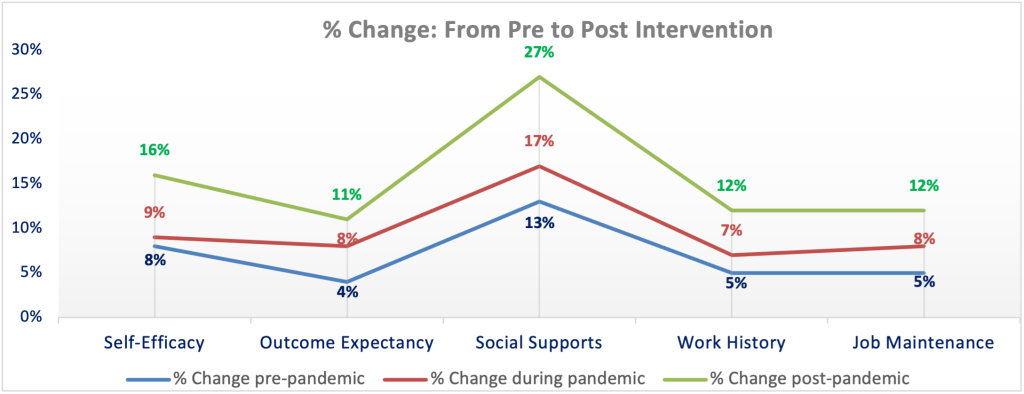|
Getting your Trinity Audio player ready...
|
The COVID-19 pandemic had profound effects on many aspects of employment. ERS conducted a study to examine the impact of the pandemic on the soft skills of people seeking employment through workforce development agencies and non-profit organizations. Specifically, we assessed the changes in soft skills before, during and after the pandemic using the Employment Readiness Scale (ERS), an online self-assessment tool that measures soft skills, employability factors and challenges.
Using ERS data over a 5-year span, we gained interesting insights into the long-term effects of the pandemic on employment-related skills.
Employment readiness
For example, the ERS data showed a negligible difference in clients assessed as “employment not ready” clients between the pre-COVID and during-COVID periods (71.8% and 72.0% respectively). However, this percentage increased to 74.4% after the pandemic’s official end. While the data does not point to any conclusive evidence for this increase, potential factors may include:
- Increased presence of multi-barrier clients within workforce development agencies.
- The pandemic’s impact on the well-being of clients seeking employment.
- A substantial influx of newcomers – many of whom may have been unprepared for the Canadian job market.
Client challenges
This research also evaluated the top five challenges reported by clients – and uncovered significant differences. Not surprisingly, housing emerged as the primary concern, rising from 53% during the pandemic to 59% after the pandemic. Feelings of helplessness rose from 45% to 48%, and feelings of failure increased from 40% to 46%. Interestingly, the lack of financial resources to sustain oneself decreased from 61% prior to the pandemic to 55% after, likely influenced by government financial assistance programs and reduced spending during the pandemic.
Soft skills progression
In analyzing the impact of program interventions, we found large variations. The ERS assessments –conducted at client intake to set a benchmark and then repeated after a program intervention – allowed us to measure progress in soft skills development. The chart below shows the impact of interventions before, during and after the COVID-19 pandemic.
During the pre-COVID period, only social supports exhibited significant improvement (13%) between the initial and subsequent assessments. However, the post-COVID era witnessed substantial progress across all five soft skills. Notably, outcomes expectancy demonstrated an improvement of 11%, while social supports saw a remarkable surge of 27%. These findings suggest a comprehensive and positive impact of interventions on clients’ employability and readiness for the job market. A couple of factors may contribute to this observed improvement:
- Client reflection during the pandemic: The extended duration of the pandemic provided clients with an opportunity for introspection, allowing them to reassess their career objectives and gain a clearer understanding of the necessary steps for achievement. This self-reflection likely played a crucial role in enhancing their soft skills.
- Enhanced targeted interventions: The success observed may be attributed to the refinement and targeting of interventions. A more precise and tailored approach seems to have been employed, addressing specific soft skill areas and contributing to the across-the-board improvements.
However, we also found differences in soft skills progression when comparing two distinct age groups – 19-24 and 30-45 years. While the older age group saw improvements across the five soft skills for the three time periods, the increase was lower in comparison to the younger cohort. This suggests that the younger age group was more responsive to interventions and displayed greater resilience in enhancing their soft skills compared to the older cohort. Overall, our analysis indicates that age may indeed play a role in how individuals perceive and respond to interventions aimed at improving soft skills. This underscores the importance of tailored intervention strategies to address the unique needs of different age demographics.
The crucial role of workforce development
The interventions implemented during the three time periods analyzed in this study have demonstrated a significant impact on improving soft skills among individuals seeking employment. Specifically, certain soft skills categories showed notable improvements, particularly during and post-pandemic. Clients have recognized the importance of being proficient in soft skills for achieving success in the workplace, underscoring the need for continued investment in skill development programs.
Our findings also highlight the adaptability and responsiveness of younger cohorts to interventions aimed at enhancing soft skills. This suggests the importance of tailoring intervention strategies to different age demographics to maximize effectiveness.
Moving forward, workforce development agencies can play a crucial role in supporting clients’ soft skills development. It is essential for agencies to identify and implement multiple strategies to strengthen and reinforce the five key soft skills identified in this study. By mindfully integrating the building of these skills into everyday employment services, agencies can significantly contribute to their clients’ immediate and long-term work life success.





